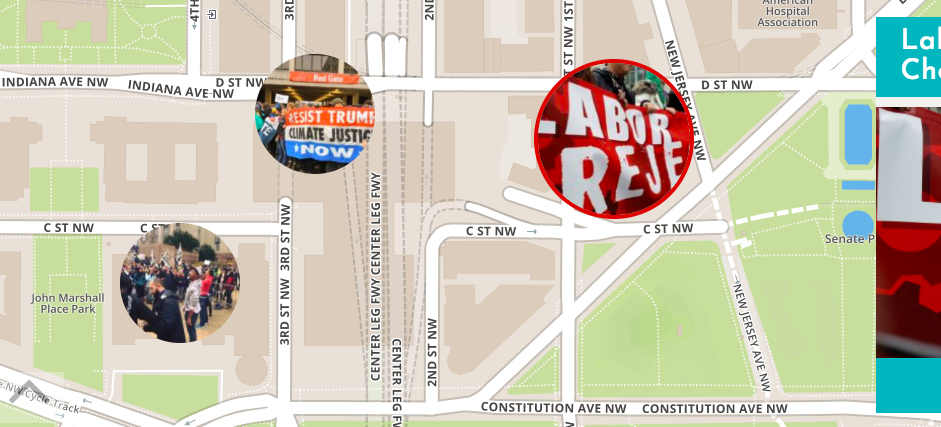
Judge Reins In DOJ’s Attempt To Get Info On Users Of Anti-Trump Site
The Justice Department will still be able to see emails sent through the site, but only if identifying information is redacted
A judge in Washington, D.C., has thrown a wrench into the Justice Department’s effort to collect information on people who communicated through a website site critical of President Trump, ruling that the DOJ “does not have the right to rummage through the information” on the site to “discover the identity of, or access communications by, individuals not participating in alleged criminal activity.”
If you’re coming to this story late, the dispute centers around the website DisruptJ20.org, which was an information source for one of the several protests mounted in and around the Jan. 20, 2017, inauguration of Trump. The particular protest connected to this site resulted in the arrest of some 200 people, some of whom have since been charged with felony rioting.
But in its initial warrant [PDF], the DOJ sought to compel the site’s hosting provider, DreamHost, to turn over all available information on all of the visitors to the DisruptJ20 site.
That list would be around 1.3 million people — 6,5000 times the number arrested during the protest — and certainly including many people who never attended the event. There’s also a good possibility that some of those visitors are supporters of the president, who merely visited the site out of curiosity.
DreamHost challenged this sweeping warrant, leading the government to claim that it was being misunderstood, and that it didn’t really want all of that data; just the emails passed through the site, regardless of whether they were conspiratorial or not.
As a result, the court allowed the warrant to be enforced, granting the government the ability to look through all the data held by DreamHost, but only retaining the information relevant to the government’s criminal investigation.
That’s when the folks at Public Citizen moved to intervene on behalf of a group of anonymous DisruptJ20 users whose communications would be caught up in this warrant.
In that filing [PDF], Public Citizen argued that these users — none of whom have been charged with a crime — were nonetheless being treated as criminal suspects simply because they chose to communicate with others about their political activism.
Allowing the DOJ to know more about the communications of these innocent and un-indicted users would, per the filing “lead to identifying them to a federal government that is increasingly hostile to dissent.”
What’s more, noted the Doe users, they were better situated than DreamHost to put up a First Amendment opposition to the DOJ’s search warrant as it is their free speech that is implicated by the government’s data demand, while DreamHost is merely a bunch of servers where this speech lives.
This afternoon, Chief Judge Robert Morin of the Superior Court of the District of Columbia issued a ruling [PDF] that reins in the DOJ’s ability, preventing it, in Morin’s words, “from obtaining any identifying information of innocent persons to the website DisruptJ20.”
More precisely, the DOJ will not get access to the list of all people on the DisruptJ20 listservs, nor will it have unfettered access to any identifying information included in emails sent or received through the website. Public Citizen had argued that the DOJ never identified a good reason that it should be able to read these emails at all, but acknowledges that the judge’s ruling will at least prevent the government from having the identities of the users who wrote them.
If the government wants any of this identifying data, it would have to demonstrate to the court, through a multi-step process, that certain accounts or communications should be un-redacted because they likely contain evidence of planning, organizing, coordinating, or carrying out a riot.
There is a catch here, as the judge will allow the DOJ to file this later request for data under seal, meaning its justifications can’t be publicly scrutinized or challenged by those who could be affected by having their names attached to a criminal investigation. However, Public Citizen says it believes that the ruling requires the government to notify the attorneys representing the anonymous site users if it is seeking to un-redact their info.
With regard to what happens to all the data it doesn’t end up using, the government had proposed that it would seal this info, but the judge says that the DOJ must delete any data that the court has not explicitly said it can hold onto. Nor can the DOJ “distribute, publicize, or otherwise make known” this information, including to other law enforcement or government entities.
The DOJ had argued that, in addition to any incriminating evidence, it should be allowed to retain any exculpatory evidence. However, the judge denied this request because that “information is outside the scope of the Warrant, and thus, the government should never have had access to it.”
Want more consumer news? Visit our parent organization, Consumer Reports, for the latest on scams, recalls, and other consumer issues.

